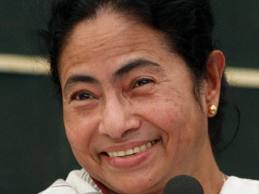
"I love the people of Gujarat, but not NaMo, NaMo," she told an election rally here in Nadia district.
"Some are saying why I am not taking names (of Modi). Why should I name everyone? Can everybody be named? Let them be. I will speak about policies.
"Remember there is Lakshman rekha. I maintain political courtesy. And, that is I speak politically and on policies. I am not like Congress, CPI(M) and BJP," she said.
"We have paid Rs 74,000 crores as interest payment for the huge loans taken by the previous Left Front government in the last three years. If they had to pay so much then would it have been Namo, Namo or No, No?" she asked.
Banerjee hit out at the Gujarat Chief Minister for taking credit for development work in in his state.
"Unlike in Gujarat there is no riot in West Bengal, while the number of child deaths and maternal deaths are much lower in West Bengal," she claimed.
"It is only the Trinamool Congress which can resist the communal BJP and unmask the Congress which while running the government at the Centre followed anti-people policies like FDI in retail and was also responsible for price rise," she said.
"BJP is a party of rioters. We do not support riots. We will take action if any attempt is made to create riots. We want that Hindus and Muslim should live together in peace and happiness," Banerjee said.
Justifying her party's decision to walk out of the Congress-led UPA government in 2012, she alleged that they tried to silence some (of their allies) by threatening to use CBI and enforcement directorate.
"But Trinamool Congress is the only party which is not afraid of such threats," Banerjee said and repeatedly gave 'Delhi chalo' calls.
She reiterated that if the Trinamool Congress was in a position to play a role in Delhi after the results of Lok Sabha elections were out, she said, it would have a stand on the programmes of the next government whose implementation it would ensure.
"We have to win as many as seats from Bengal to ensure that Bengal plays a key role," she added.





Comments
Add new comment